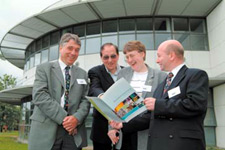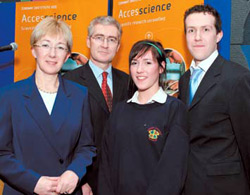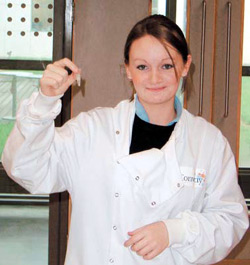 Launched in September 2003, the
Conway Institute is now fully operational. Based on a principle of multidisciplinary occupancy supported by shared central services, the large, open plan laboratories accommodate up to 430 researchers over four wings. The smooth operation of each laboratory with its range of scientific services is the responsibility of a dedicated member of the Conway directorate (laboratory services).
To date, the Conway Institute has invested several million euro in the development of its core technology programme. The equipment is centrally located, properly maintained and managed by a cohort of technical staff. The Conway Institute implemented a tailor-made, web-based purchasing system, which allows researchers to order goods electronically from their desktops. Orders are processed by, and delivered to, the central Conway Institute stores, which dealt with over 10,000 individual orders in the first year
Launched in September 2003, the
Conway Institute is now fully operational. Based on a principle of multidisciplinary occupancy supported by shared central services, the large, open plan laboratories accommodate up to 430 researchers over four wings. The smooth operation of each laboratory with its range of scientific services is the responsibility of a dedicated member of the Conway directorate (laboratory services).
To date, the Conway Institute has invested several million euro in the development of its core technology programme. The equipment is centrally located, properly maintained and managed by a cohort of technical staff. The Conway Institute implemented a tailor-made, web-based purchasing system, which allows researchers to order goods electronically from their desktops. Orders are processed by, and delivered to, the central Conway Institute stores, which dealt with over 10,000 individual orders in the first year
Launch of the Proteome Research Centre
 (L-R) Pictured at the launch of the Proteome Research Centre: Prof Denis Hochstrasser, Geneva University Hospital; Prof Michael Dunn, then King's College London & currently at Conway Institute; Dr Rosamunde Banks, University of Leeds and Prof Stephen Pennington, Conway Institute.
The Conway Institute Proteome Research Centre, under the leadership of Professor Stephen Pennington was launched with an opening symposium on June 3rd - 4th 2004. The programme included lectures from world-leaders in the field of proteomics. This new facility has the most diverse mixture of instrumentation and software available anywhere in Ireland for the study of proteins. The major focus of the proteomic research programme is to identify new biological markers of disease and possible targets for therapy.
(L-R) Pictured at the launch of the Proteome Research Centre: Prof Denis Hochstrasser, Geneva University Hospital; Prof Michael Dunn, then King's College London & currently at Conway Institute; Dr Rosamunde Banks, University of Leeds and Prof Stephen Pennington, Conway Institute.
The Conway Institute Proteome Research Centre, under the leadership of Professor Stephen Pennington was launched with an opening symposium on June 3rd - 4th 2004. The programme included lectures from world-leaders in the field of proteomics. This new facility has the most diverse mixture of instrumentation and software available anywhere in Ireland for the study of proteins. The major focus of the proteomic research programme is to identify new biological markers of disease and possible targets for therapy.
Marie Curie PhD Programme in Molecular Neuroimmunology
Following an award from the European Commission, the Conway launched a 3-year Ph.D programme in Molecular Neuroimmunology this year. Neuroimmunology is an exciting new area of research concerned with interactions between the immune and nervous systems, which has enormous potential for contributing to our understanding of physiological and disease processes. This programme will equip researchers for a successful research career in this area.
Awards
The inaugural Science Foundation Ireland President of Ireland Young Researcher award was made to Dr Jens Nielson for his research programme, which will develop a database tool for organising, analysing and sharing experimental data on enzymes (proteins that speed up reactions within the body). This database will focus on mutations or changes that can affect activity in three enzymes, which are important in HIV, cell signalling and cancer. Using the database, researchers worldwide will be able to predict enzyme action.
Dr Manuela Tosin received the 2004 Royal Irish Academy Award for Young Chemists for her doctoral thesis on
Novel Synthetic and Structural Studies in Carbohydrate Chemistry.
AccesScience '05
 (L-R) Minister Mary Hanafin TD, Dr Hugh Brady, UCD President, Aoibheann Greenan and Kevin Murtagh, AccesScience winners.
AccesScience '05
took place in O'Reilly Hall, UCD on March 8th 2005. Pat Kenny hosted the grand final of this competition, which challenges postgraduate research students to explain their work without using scientific jargon. The six finalists were judged by a celebrity panel, which included Charlie Bird, Geri Maye and Pamela Flood from RTE; Senator Feargal Quinn and Brian Mullins, former all-Ireland medal winner.
Kevin Murtagh took first place for his insight into 'Mother Nature's chemistry set' and Aoibheann Greenan, a 5th year pupil from Loreto College, Swords, won the poster competition for the best visual representation of science with her entry, 'Science is Bursting with Opportunities'. Her poster along with five runner-up entries will be displayed on the DART as part of the Science Track series.
This year,
AccesScience
was expanded to include secondary school pupils.
AccesScience Junior
, a matinee version of the main event saw 450 aspiring young scientists from schools across Dublin, Wicklow, Monaghan and Kerry quizzing the finalists on their research. Kathriona Devereaux, presenter of RTE's Scope, hosted proceedings and the students were the jury!
(L-R) Minister Mary Hanafin TD, Dr Hugh Brady, UCD President, Aoibheann Greenan and Kevin Murtagh, AccesScience winners.
AccesScience '05
took place in O'Reilly Hall, UCD on March 8th 2005. Pat Kenny hosted the grand final of this competition, which challenges postgraduate research students to explain their work without using scientific jargon. The six finalists were judged by a celebrity panel, which included Charlie Bird, Geri Maye and Pamela Flood from RTE; Senator Feargal Quinn and Brian Mullins, former all-Ireland medal winner.
Kevin Murtagh took first place for his insight into 'Mother Nature's chemistry set' and Aoibheann Greenan, a 5th year pupil from Loreto College, Swords, won the poster competition for the best visual representation of science with her entry, 'Science is Bursting with Opportunities'. Her poster along with five runner-up entries will be displayed on the DART as part of the Science Track series.
This year,
AccesScience
was expanded to include secondary school pupils.
AccesScience Junior
, a matinee version of the main event saw 450 aspiring young scientists from schools across Dublin, Wicklow, Monaghan and Kerry quizzing the finalists on their research. Kathriona Devereaux, presenter of RTE's Scope, hosted proceedings and the students were the jury!
ScienceWorks
 Frances Lynch, Coolmine Community School shows off DNA she extracted
This programme of half-day workshops aimed at transition year students was launched during National Science Week in November 2004 with a second series in April 2005. 260 pupils from sixteen secondary schools across the greater Dublin area, Wicklow, Carlow and Monaghan attended these sessions. Students toured the facility before heading into the laboratory for some hands-on practical experiments in
Science@Work.
At the DNA workstation, students learned about the structure of DNA, tried to make models of the helix and then extracted DNA from bananas.
Simple experiments such as the iodine clock, sugar snake and ammonia fountain impressed the eager young scientists at the 'Chemistry Illusions' workstation. During the
Pathways2Science
sessions, they heard about the many varied and exciting career paths of staff members. Bookings are already being taken for November 2005.
Frances Lynch, Coolmine Community School shows off DNA she extracted
This programme of half-day workshops aimed at transition year students was launched during National Science Week in November 2004 with a second series in April 2005. 260 pupils from sixteen secondary schools across the greater Dublin area, Wicklow, Carlow and Monaghan attended these sessions. Students toured the facility before heading into the laboratory for some hands-on practical experiments in
Science@Work.
At the DNA workstation, students learned about the structure of DNA, tried to make models of the helix and then extracted DNA from bananas.
Simple experiments such as the iodine clock, sugar snake and ammonia fountain impressed the eager young scientists at the 'Chemistry Illusions' workstation. During the
Pathways2Science
sessions, they heard about the many varied and exciting career paths of staff members. Bookings are already being taken for November 2005.
Contact: Elaine Quinn, Communications & Education Officer,
Conway Institute of Biomolecular & Biomedical Research,
UCD Belfield, Dublin 4;
Tel : (+353-1) 716 6706; E-mail:
[email protected]
Web:
www.ucd.ie/conway
|




